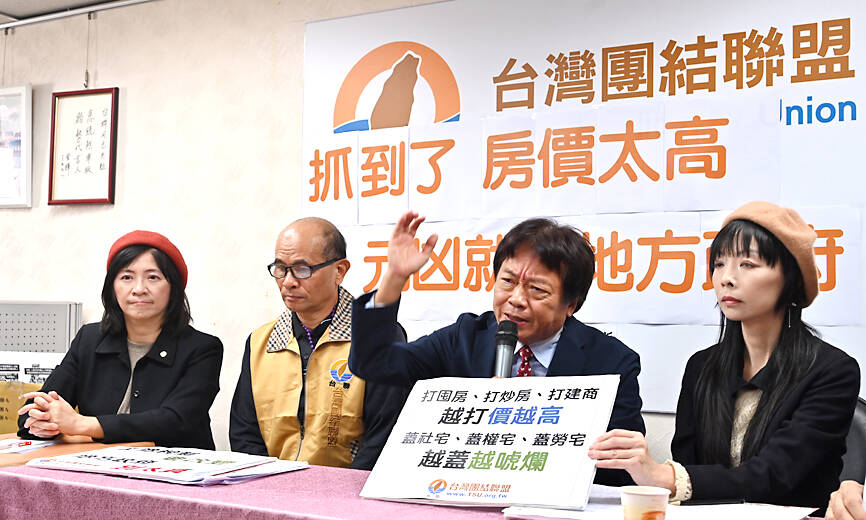Issues of housing justice and steep real-estate prices have led to dissatisfaction among young voters, who are turning away from the two major parties, the Taiwan Solidarity Union (TSU) said yesterday, blaming unreasonably high housing taxes collected by local governments.
“The ruling Democratic Progressive Party (DPP) government has taken up measures to bring down property prices and has promoted fairness and housing justice for years, but housing prices in cities are still climbing,” TSU Chairman Liu Yi-te (劉一德) told a news conference at the party’s office in Taipei.
Liu said these measures include heavy fines and other punishments to combat property speculation by investors, as well as a registration requirement for the actual price of a transaction to prevent the recording of inflated prices and deter owners and agents from taking advantage of the opaque process, he said.

Photo: Liu Hsin-de, Taipei Times
In recent years, one main reason for the surging prices is rezoning by local governments, opening plots for farming and industrial use, and for real-estate development, as the land can increase in assessed value by 10 times or more overnight, while local governments make huge financial gains by collecting the Land Value Increment Tax, which could be as much as 10 to 20 percent, Liu said.
This has been a major source of tax revenue for Taiwan’s six special municipalities in recent years and is the main driver of high real-estate prices, he said.
High property prices cause the younger generation to choose not to marry or raise a family, creating a declining birthrate, resulting in sectors of “dissatisfied, frustrated” young voters who are turning against the DPP and the Chinese Nationalist Party (KMT), he said.
To drive down prices and enact fairer policies, former TSU legislator Chou Ni-an (周倪安) provided several recommendations, including for the government to build more social housing and subsidize housing for younger people
On taxes from land rezoning, TSU legislator-at-large candidate Chang Teng-kai (張登凱) said that 30 percent of these tax revenues should be allocated specifically toward achieving housing justice, such as the provision of financial assistance to younger people for purchasing or renting a home, and housing subsidies for working-class people and senior citizens.
Chang said that taxes collected by local governments should be put into a dedicated “public housing assistance and saving fund” to help younger generations, laborers and senior citizens in subsidizing their rent or first-time home, or go into building social housing units.
TSU social movement department head Ou Yang Jui-lien (歐陽瑞蓮) said that the government could learn from Singapore in providing fair and low-cost housing for all of society.
Singapore has constructed extensive social housing for its citizens, and the monthly fees are not based on the land values of a particular city section, but rather is means tested in which working-class households would pay in accordance with their lower monthly income, while those with a higher monthly salary would pay a higher rate, she said.

Taiwan has received more than US$70 million in royalties as of the end of last year from developing the F-16V jet as countries worldwide purchase or upgrade to this popular model, government and military officials said on Saturday. Taiwan funded the development of the F-16V jet and ended up the sole investor as other countries withdrew from the program. Now the F-16V is increasingly popular and countries must pay Taiwan a percentage in royalties when they purchase new F-16V aircraft or upgrade older F-16 models. The next five years are expected to be the peak for these royalties, with Taiwan potentially earning

STAY IN YOUR LANE: As the US and Israel attack Iran, the ministry has warned China not to overstep by including Taiwanese citizens in its evacuation orders The Ministry of Foreign Affairs (MOFA) yesterday rebuked a statement by China’s embassy in Israel that it would evacuate Taiwanese holders of Chinese travel documents from Israel amid the latter’s escalating conflict with Iran. Tensions have risen across the Middle East in the wake of US and Israeli airstrikes on Iran beginning Saturday. China subsequently issued an evacuation notice for its citizens. In a news release, the Chinese embassy in Israel said holders of “Taiwan compatriot permits (台胞證)” issued to Taiwanese nationals by Chinese authorities for travel to China — could register for evacuation to Egypt. In Taipei, the ministry yesterday said Taiwan

‘LIKE-MINDED PARTNER’: Tako van Popta said it would be inappropriate to delay signing the deal with Taiwan because of China, adding he would promote the issue Canadian senators have stressed Taiwan’s importance for international trade and expressed enthusiasm for ensuring the Taiwan-Canada trade cooperation framework agreement is implemented this year. Representative to Canada Harry Tseng (曾厚仁) in an interview with the Central News Agency (CNA) said he was increasingly uneasy about Ottawa’s delays in signing the agreement, especially as Ottawa has warmed toward Beijing. There are “no negotiations left. Not only [is it] initialed, we have three versions of the text ready: English, French and Mandarin,” Tseng said. “That tells you how close we are to the final signature.” Tseng said that he hoped Canadian Prime Minister Mark Carney

Taiwan is awaiting official notification from the US regarding the status of the Agreement on Reciprocal Trade (ART) after the US Supreme Court ruled US President Donald Trump's global tariffs unconstitutional. Speaking to reporters before a legislative hearing today, Premier Cho Jung-tai (卓榮泰) said that Taiwan's negotiation team remains focused on ensuring that the bilateral trade deal remains intact despite the legal challenge to Trump's tariff policy. "The US has pledged to notify its trade partners once the subsequent administrative and legal processes are finalized, and that certainly includes Taiwan," Cho said when asked about opposition parties’ doubts that the ART was